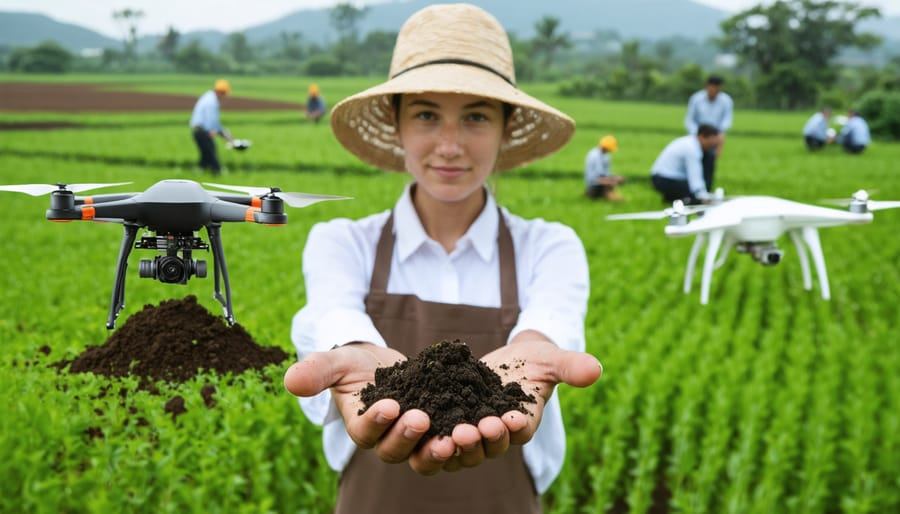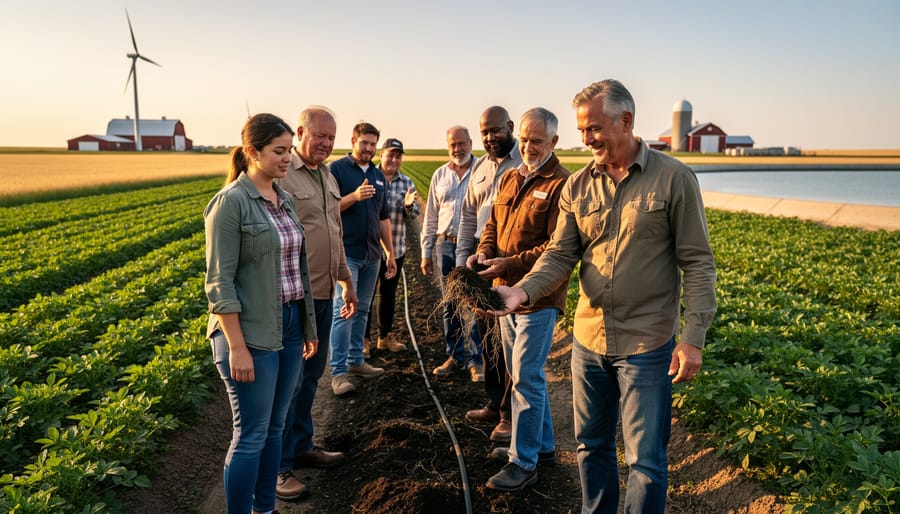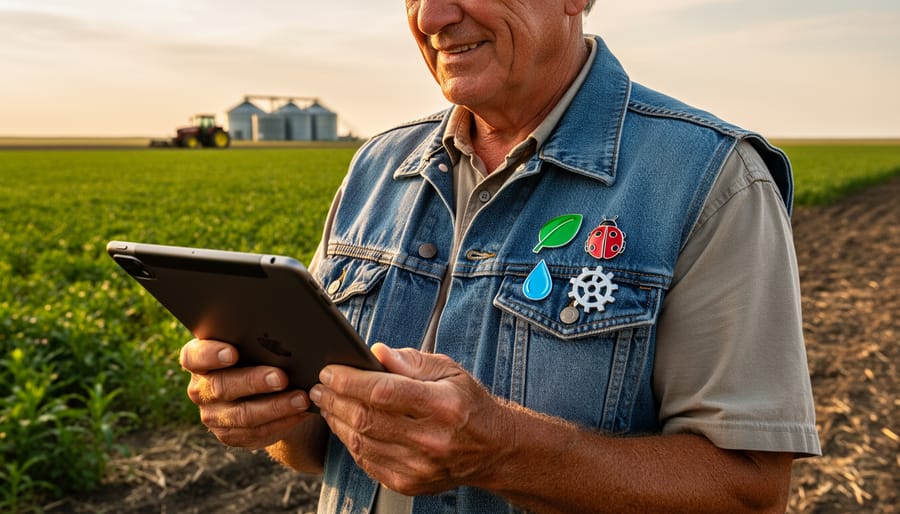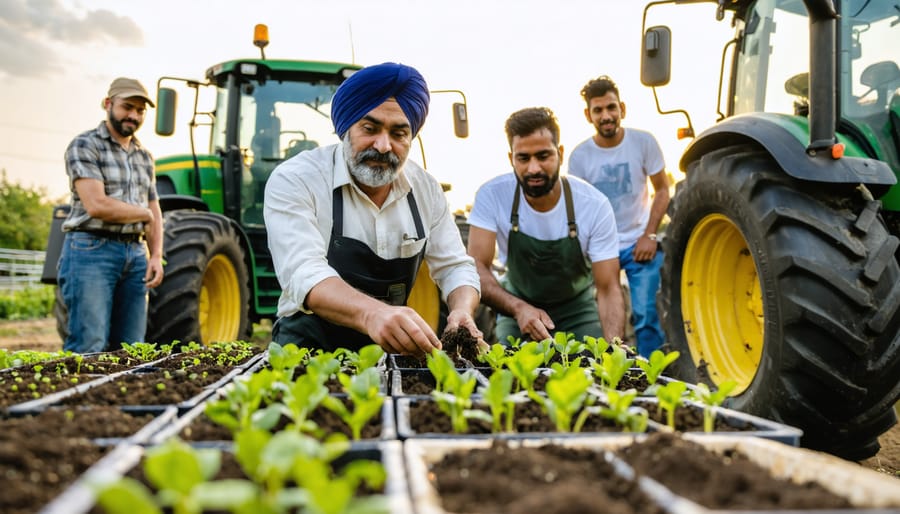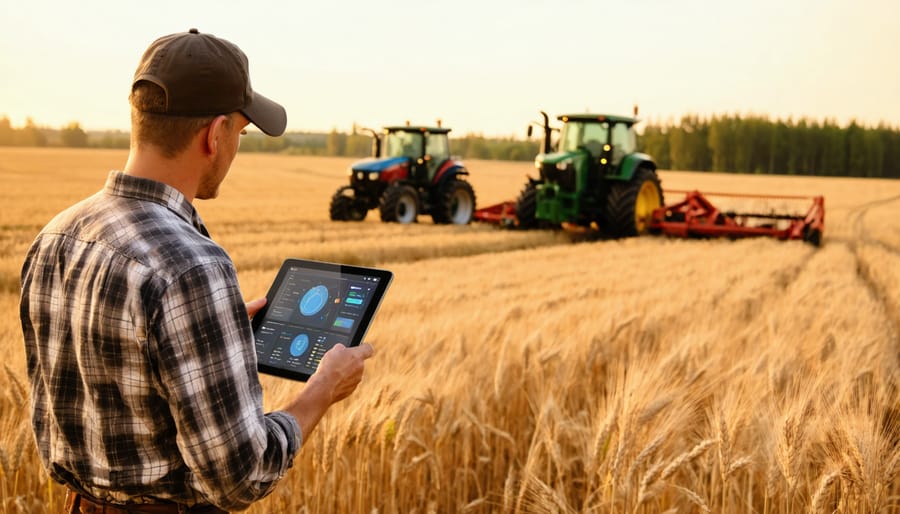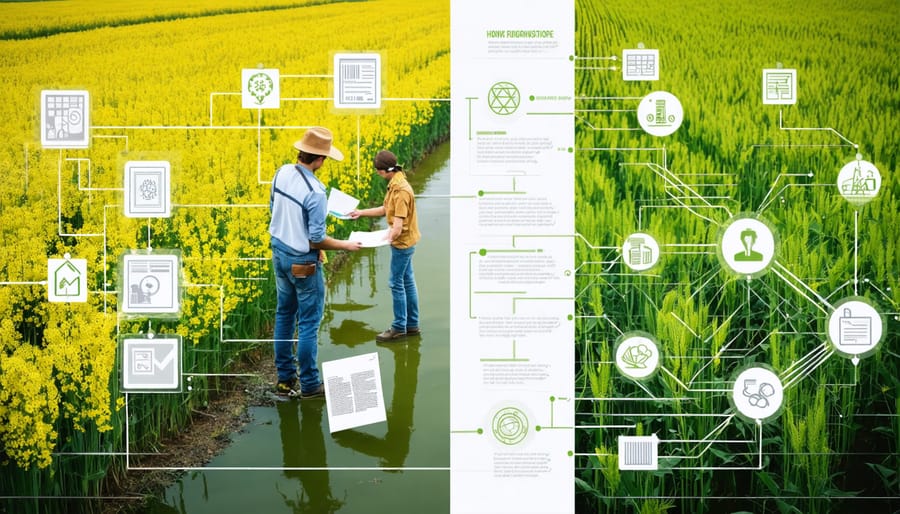Transform your farming operation through intensive hands-on learning experiences designed specifically for Alberta’s agricultural landscape. Modern agriculture workshops deliver practical solutions for increasing crop yields, implementing sustainable practices, and mastering precision farming techniques—all while connecting with fellow producers who understand local growing conditions.
From soil health management to advanced irrigation systems, these interactive sessions bring together leading Canadian agricultural experts and innovative farmers who’ve successfully adapted to changing climate patterns. Working directly with the latest equipment and testing soil samples from your own fields creates an immediate, practical impact on your operation.
Whether you’re a fourth-generation farmer or new to agriculture, these workshops offer tailored learning paths that respect traditional knowledge while embracing cutting-edge technologies. Join a growing community of forward-thinking producers who are revolutionizing Canadian agriculture through collaborative learning and shared expertise.
Hands-On Soil Health Workshops
Field Testing and Analysis
Field testing workshops provide hands-on experience in essential soil health management practices, offering farmers practical skills they can immediately apply to their operations. During these sessions, participants learn proper soil sampling techniques using industry-standard tools and methods specific to Alberta’s diverse soil conditions.
Typical workshops include collecting soil samples from different field depths, identifying soil structure characteristics, and understanding optimal sampling patterns across various terrain types. Participants receive guidance on proper sample handling and storage to ensure accurate laboratory results.
The analysis portion of these workshops focuses on interpreting soil test reports, with local agronomists explaining how to read nutrient levels, pH values, and organic matter content. Farmers learn to translate these technical results into actionable steps for their specific crops and field conditions.
Many workshops incorporate real-time demonstrations using portable soil testing kits, allowing participants to conduct basic analyses in the field. This hands-on experience helps farmers develop confidence in making informed decisions about fertilizer applications, amendment needs, and crop rotation planning.
Local success stories often feature farmers who have implemented knowledge gained from these workshops to optimize their soil management practices, resulting in improved yields and reduced input costs. Workshop facilitators encourage participants to maintain detailed records of their soil testing results to track changes over time and adjust their management strategies accordingly.
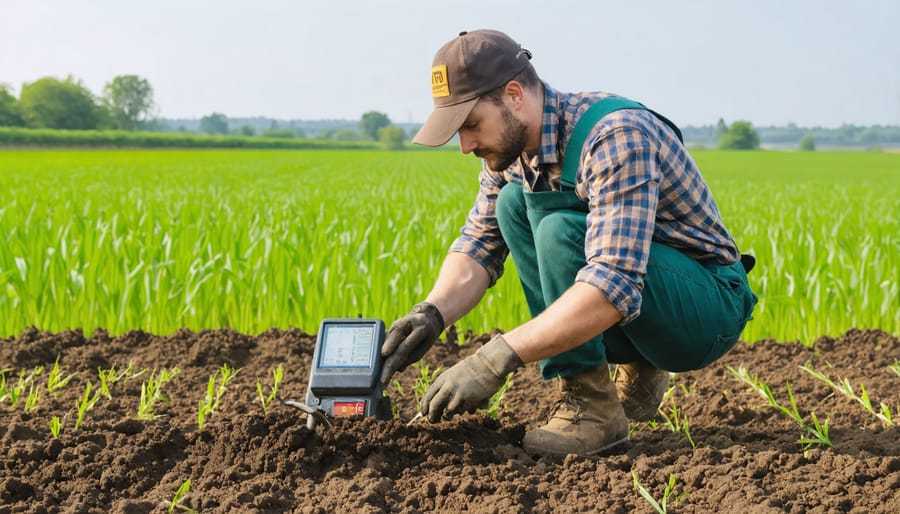
Carbon Sequestration Techniques
These hands-on workshops focus on practical techniques to enhance soil carbon storage, helping Alberta farmers contribute to climate solutions while improving their soil health. Participants learn proven methods like no-till farming, cover cropping, and crop rotation strategies specifically adapted for our prairie conditions.
Local soil expert Sarah Thompson demonstrates how implementing diverse cover crop mixtures can increase organic matter content by up to 2% over five years. Workshop attendees get hands-on experience testing soil samples and learning to interpret carbon content measurements using both field and laboratory methods.
The sessions explore successful case studies from Alberta farms, including the Miller Family Farm in Red Deer County, which increased their soil organic carbon by 1.5% through strategic residue management and perennial crop integration. Farmers learn about financial incentives available through Canada’s carbon offset programs while gaining practical skills in record-keeping and verification procedures.
Interactive demonstrations show proper calibration of seeding equipment for intercrops and cover crops, as well as timing considerations for the local growing season. Participants receive region-specific planting calendars and soil amendment guidelines to help implement these practices on their own operations.
The workshops emphasize building resilient farming systems through improved soil biology, featuring practical exercises in compost application, green manure management, and grazing integration for optimal carbon sequestration results.
Sustainable Crop Management Sessions
Organic Pest Control
In this hands-on workshop, participants explore effective and environmentally friendly pest management solutions that align with organic farming practices. Led by experienced Alberta-based agricultural specialists, attendees learn to identify common regional pests and implement natural control methods that protect both crops and beneficial insects.
The workshop covers companion planting strategies, featuring successful combinations like marigolds with tomatoes and dill with brassicas, proven effective in local growing conditions. Participants gain practical experience in creating natural pest deterrents using locally available materials, including garlic and hot pepper sprays, neem oil applications, and beneficial insect attractants.
A significant portion focuses on preventive measures, such as crop rotation planning and soil health management, which naturally boost plant resistance to pest pressure. Farmers learn to establish habitat corridors that attract natural predators like ladybugs, parasitic wasps, and birds – creating a balanced ecosystem that self-regulates pest populations.
Workshop attendees receive hands-on training in monitoring techniques and action thresholds specific to Alberta’s growing conditions. They learn when intervention is necessary and how to select the most appropriate organic control method for different situations. The session includes a practical demonstration of installing physical barriers and traps, complemented by real-world success stories from local organic farmers who have successfully transitioned from conventional pest control methods.
Take-home resources include seasonal pest management calendars, natural recipe cards for organic sprays, and a comprehensive guide to beneficial insects common to the Canadian prairies.

Water Conservation Methods
Our water conservation sessions equip farmers with practical strategies to maximize irrigation efficiency while protecting this precious resource. Drawing from successful case studies across Alberta, these workshops demonstrate how modern technology and traditional wisdom can work together to reduce water consumption without compromising crop yields.
Participants learn about soil moisture monitoring techniques using both manual methods and advanced sensors, helping them make informed decisions about irrigation timing and volume. Local irrigation specialist Sarah Thompson shares her expertise on implementing variable-rate irrigation systems, which have helped regional farmers reduce water usage by up to 30% while maintaining productivity.
The workshops cover essential topics like drip irrigation installation, maintenance of irrigation equipment, and strategies for minimizing evaporation loss. Farmers will explore real-time weather monitoring tools and scheduling techniques that consider soil type, crop requirements, and local climate patterns.
A significant portion of the session focuses on drought-resistant crop varieties suitable for Alberta’s climate and innovative mulching techniques that help retain soil moisture. Participants also learn about water-efficient crop rotation strategies and the benefits of conservation tillage in maintaining soil moisture levels.
Through hands-on demonstrations, attendees practice calculating crop water requirements and adjusting irrigation systems for optimal performance. The workshop includes a detailed review of provincial water regulations and available government incentives for implementing water-saving technologies.
Local success stories, like the Jensen family farm’s transition to precision irrigation, demonstrate how these methods can lead to substantial water savings while maintaining profitable operations. The sessions conclude with practical planning exercises to help farmers develop customized water management strategies for their operations.
Technology Integration Workshops

Precision Agriculture Tools
Our precision agriculture workshops provide hands-on experience with cutting-edge digital farming technology that’s transforming Canadian agriculture. Participants learn to operate GPS-guided tractors, program automated irrigation systems, and analyze drone-captured field data using industry-standard software.
Working in small groups, farmers get practical experience with soil sensors that measure moisture levels and nutrient content in real-time. Our certified instructors demonstrate how to interpret this data to make informed decisions about irrigation scheduling and fertilizer application. Workshop participants also learn to use yield mapping systems and variable rate technology to optimize resource use across their fields.
A highlight of these sessions is the drone operation training, where attendees learn to conduct aerial surveys and process multispectral imagery. This technology helps identify crop stress, pest issues, and irrigation problems before they become visible to the naked eye.
We emphasize cost-effective solutions that work for farms of all sizes. Local success stories, like the Jensen family farm in Red Deer who reduced water usage by 30% after implementing precision irrigation techniques, demonstrate the practical benefits of these tools. Participants leave with actionable knowledge they can immediately apply to their operations, along with ongoing support from our technical team.
Data Management Systems
Modern farming success relies heavily on smart data management, and our workshops equip you with the tools and knowledge to make data work for your operation. Through hands-on training sessions, you’ll learn to collect, organize, and analyze crucial farm data using both traditional methods and cutting-edge digital platforms.
Our expert instructors guide you through practical exercises in tracking soil conditions, crop yields, weather patterns, and resource utilization. You’ll discover how to use popular farm management software to streamline your record-keeping and make data-driven decisions. Participants learn to create effective spreadsheets, maintain digital field records, and generate meaningful reports that can guide future planning.
The workshops include sessions on GPS mapping, precision agriculture data interpretation, and market trend analysis. We emphasize the importance of maintaining accurate records for regulatory compliance while showing you how to use this data to optimize your farm’s efficiency and profitability.
Local success stories demonstrate the power of good data management. For instance, a Lethbridge dairy farmer increased milk production by 15% after implementing systematic data tracking methods learned in our workshop. Similarly, a grain producer from Red Deer used weather pattern data analysis to optimize their irrigation schedule, resulting in significant water savings.
These practical skills help you transform raw numbers into actionable insights, ensuring your farm operations remain competitive and sustainable in today’s data-driven agricultural landscape.
Local Success Stories
The success stories of Alberta farmers who’ve implemented workshop learnings showcase the tangible benefits of agricultural education in our community. Take Sarah Peterson, a third-generation farmer from Lacombe County, who transformed her traditional grain operation after attending soil health workshops. By implementing cover cropping techniques and reduced tillage practices, she increased her soil organic matter by 2% over three years and reduced irrigation needs by 30%.
In Lethbridge, the Martinez family applied knowledge gained from precision agriculture workshops to optimize their 800-hectare operation. Using soil mapping and variable rate technology, they reduced fertilizer usage by 25% while maintaining yield levels, resulting in significant cost savings and environmental benefits.
Dean Thompson, an emerging farmer from Red Deer County, credits livestock management workshops for his successful transition from conventional to regenerative grazing practices. His innovative rotational grazing system, developed using workshop principles, led to a 40% increase in carrying capacity on his pastures and improved drought resilience.
Perhaps most inspiring is the story of the Wilson Sisters from Drumheller, who implemented greenhouse management strategies learned from year-round growing workshops. They extended their growing season by four months and now supply local restaurants with fresh produce throughout winter, creating a new revenue stream for their farm.
These success stories demonstrate how workshop learnings translate into real-world improvements. The common thread among these farmers is their willingness to embrace new knowledge and adapt it to their specific circumstances. As James Wilson, one of the workshop instructors, notes, “The most successful participants are those who come with an open mind and leave with an action plan.”
Recent data shows that farmers who regularly attend agricultural workshops report an average 15-20% improvement in operational efficiency and sustainability metrics. These local success stories continue to inspire other Alberta farmers to pursue ongoing education and implement innovative practices on their own operations.
Participating in agricultural workshops offers transformative benefits that extend far beyond the classroom setting. Throughout Alberta, farmers who have embraced these learning opportunities consistently report increased crop yields, improved soil health, and more efficient resource management. The practical skills and knowledge gained through hands-on experiences have helped many producers adapt to changing climate conditions while maintaining profitable operations.
The networking opportunities created during these workshops have proven invaluable, fostering a strong community of forward-thinking farmers who continue to share insights and support long after the sessions end. Many participants have formed lasting partnerships and mentorship relationships that contribute to the overall strength of Alberta’s agricultural sector.
To get started on your workshop journey, consider reaching out to your local agricultural extension office or joining regional farming associations. Many organizations offer both in-person and virtual workshop options throughout the year, making it easier to fit learning into your busy schedule. Early registration is recommended, as popular sessions often fill up quickly, especially during the off-season.
Remember that investing in agricultural education is an investment in your farm’s future. Whether you’re interested in precision agriculture, sustainable practices, or specialized crop management, there’s a workshop designed to meet your needs. Take the first step today by exploring upcoming workshops in your area and connecting with fellow farmers who share your commitment to continuous learning and improvement.

